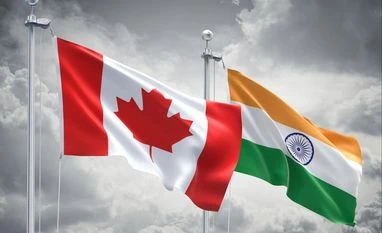Clash between India and Canada threatens to hurt trade, investment
A proposed early-stage trade deal is in jeopardy, potentially hurting India's efforts to woo the West and serve as a supply-chain alternative to China
)
Indian students may start avoiding Canada for higher education after New Delhi issued a safety advisory on the country for “anti-India” activities. This could affect a sector that brings in about C$22 billion ($16.3 billion) annually in revenues for Canada.
Listen to This Article
By Shruti Srivastava
Canada-India ties have deteriorated since Prime Minister Justin Trudeau accused New Delhi of orchestrating the assassination of a Sikh separatist leader in British Columbia. Now, the diplomatic standoff threatens to spill over into their economies.
A proposed early-stage trade deal is in jeopardy, potentially hurting India’s efforts to woo the West and serve as a supply-chain alternative to China. India’s access to Canadian potash, a key nutrient for crops, may get affected.
Indian students may start avoiding Canada for higher education after New Delhi issued a safety advisory on the country for “anti-India” activities. This could affect a sector that brings in about C$22 billion ($16.3 billion) annually in revenues for Canada.
Both nations have already expelled senior diplomats from the other side in a tit-for-tat escalation. Canada plans to reduce embassy staff as security threats rise in the South Asian country while New Delhi stopped issuing visas to Canadian citizens.
Also Read
Here’s some of the charts looking at what’s at stake:
Immigration
Indians make up nearly a fifth of immigrants to Canada, the highest share from a single place of birth since 1971, according to government data. However, remittances from Canada were less than 1% of the total flowing into India and this is in part due to immigrants permanently settling down in Canada and bringing over their families.
Immigration accounts for 90% of Canada’s labor force growth as there is fast-aging working population.
A sizable number of Indian immigrants to Canada are Sikhs from Punjab state in India. Sikhs account for 1.7% of India’s population and Canada has the highest numbers of Sikhs outside of the South Asian country.
Higher Education
Indians account for the most number of international students doing their higher education in Canada. In 2022, they made up over 28% of the total foreign students, according to local media in Canada.
Higher education is a significant sector contributing to more than 15% of Canada’s services exports annually. The latest available data by Global Affairs Canada shows that international students alone contributed 1.3% to Canada’s gross domestic product in 2019.
Trade
Trade between the two nations stood at $8.16 billion in 2022-23, dwarfing in comparison to $128.7 billion in India’s bilateral trade with the US. However, India depends almost entirely on imports for its potash needs, and buys a large amount of the crop nutrient from Canada, the world’s biggest exporter.
Supplies from Canada have become increasingly important as sanctions have disrupted trade and expansion plans for Russia and Belarus. The current frostiness may impact that.
India’s major exports to Canada include pharmaceuticals, iron and steel products. The nations were negotiating an early-stage trade deal before the talks were put on pause by Canada ahead of the Group of 20 leaders summit in New Delhi. Indian officials said it was due to “political developments.”
There were no bilateral meetings at G-20 in a sign of developing tensions but both leaders had a sideline conversation. It later emerged that Trudeau brought up the allegations on the Sikh’s murder, which Modi had responded with criticism on Canada becoming a safe haven for separatist groups.
Foreign Investment
India attracted foreign direct investment equity inflows of $3.60 billion from Canada between April 2000 and June 2023, according to government data. It’s just a share of 0.56% of the total FDI flows into India and compares with $61.26 billion from the US during the same period.
A senior official in India has said there’s no immediate impact on investments but analysts now fear the row may have a “chilling effect” on investments.
Some of the big-ticket deals include Sun Life Financial Inc.’s joint venture with India’s Aditya Birla Group while CPP Investment Board has invested $21 billion in India as of about a year ago. One of CPPIB’s key investments is a 2.7% stake in Kotak Mahindra Bank Ltd.
On foreign portfolio investment, commitments from Canada rose 1.72 trillion rupees in July this year from 1.57 trillion rupees in April.
More From This Section
Don't miss the most important news and views of the day. Get them on our Telegram channel
First Published: Sep 27 2023 | 9:00 AM IST


